
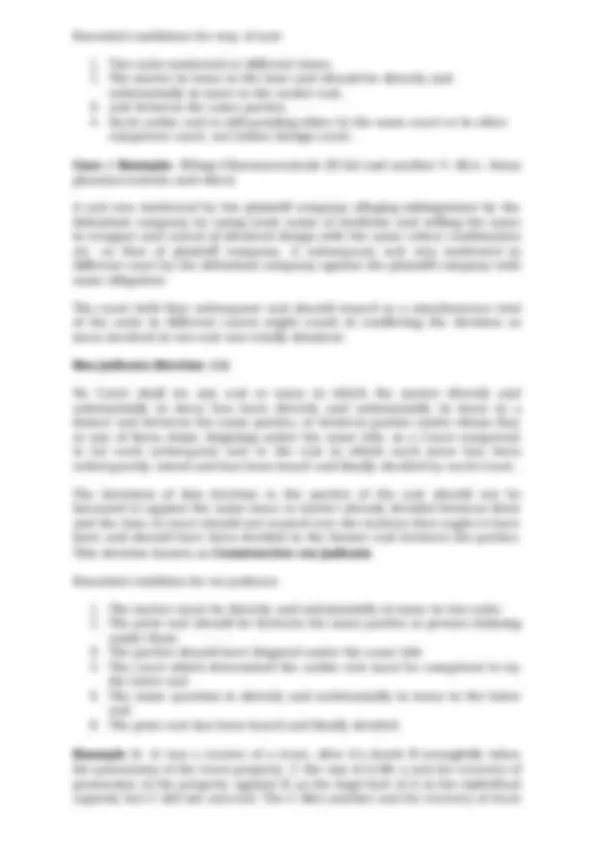
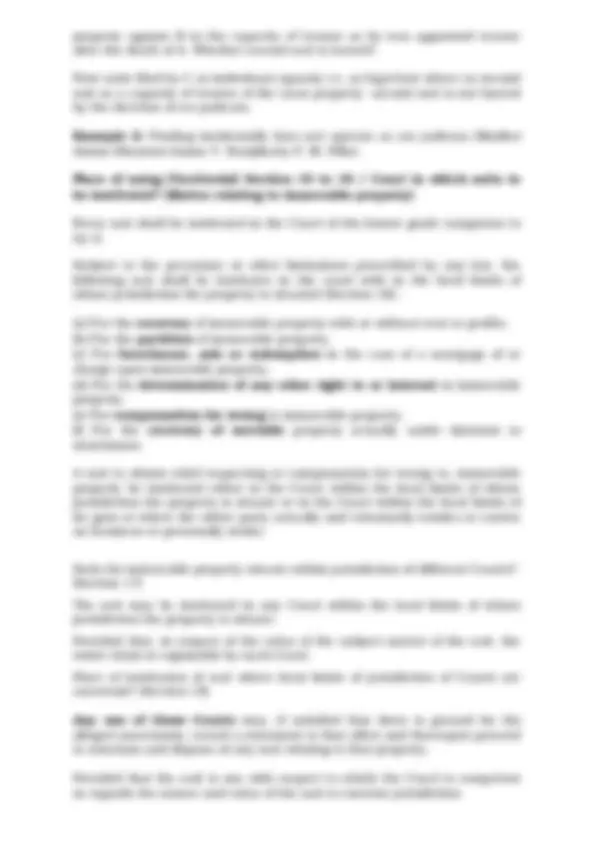
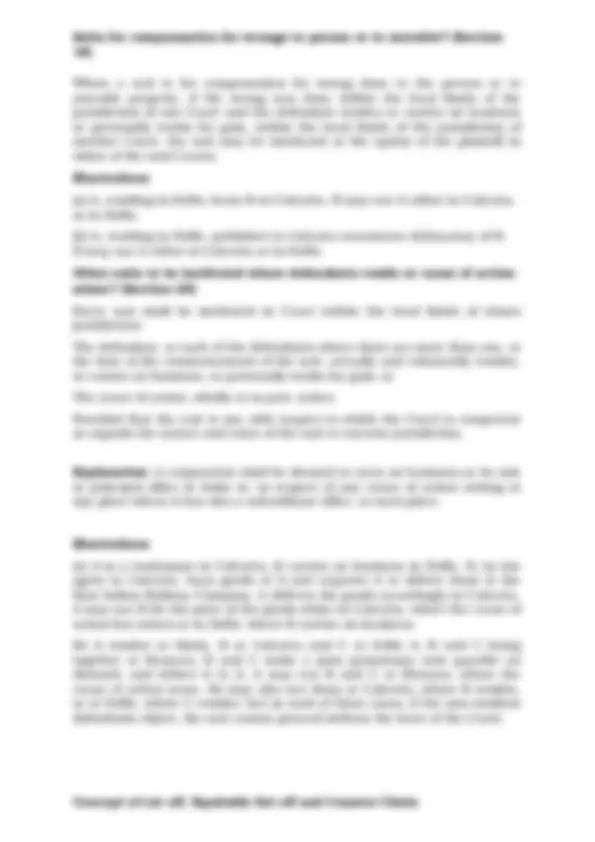
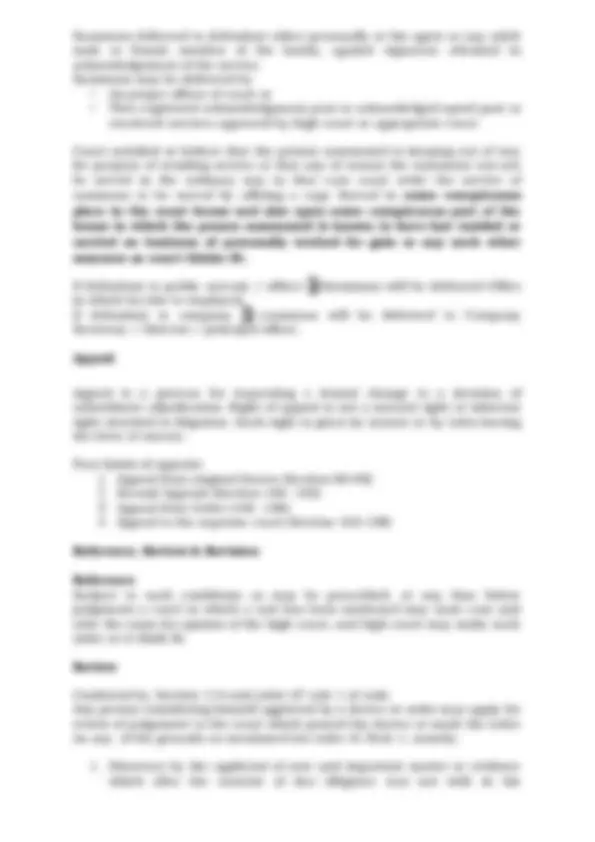
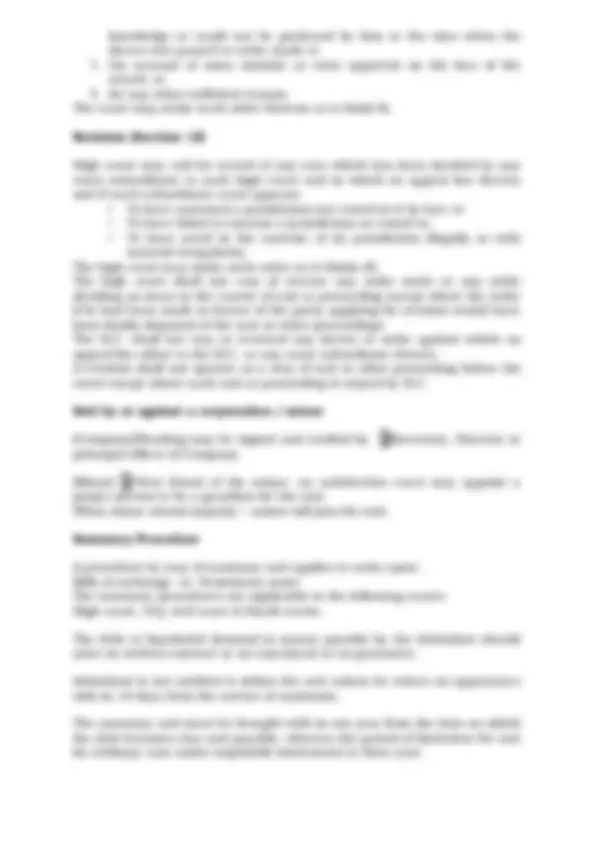
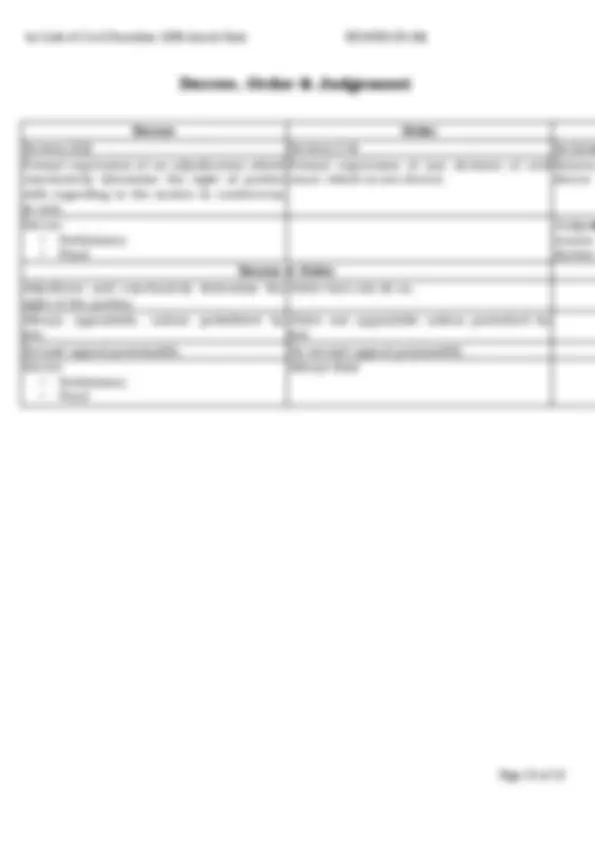


Study with the several resources on Docsity

Earn points by helping other students or get them with a premium plan


Prepare for your exams
Study with the several resources on Docsity

Earn points to download
Earn points by helping other students or get them with a premium plan
Community
Ask the community for help and clear up your study doubts
Discover the best universities in your country according to Docsity users
Free resources
Download our free guides on studying techniques, anxiety management strategies, and thesis advice from Docsity tutors
res subjudice and res judicator
Typology: Essays (university)
1 / 10

This page cannot be seen from the preview
Don't miss anything!







Decree, Order & Judgement
Decree
Defined u/s 2(2) of Civil Procedure Code, 1908. It means the formal expression of an adjudication which conclusively determines the rights of the parties with regard to all or any of the matter in controversy in the suit.
A decree may be either preliminary or final.
A decree is preliminary when a further procedure has to be taken before the suit can be completely disposed off. When adjudication completely disposes of the suit such decree is final.
It may be noted that the term decree doesn’t include the following:
“Formal expression” means the recordation of the ruling of the Court on the matter presented before it, so far as the Court expressing it alludes to the fact that the same issue cannot be adjudicated by or before the Court again but only before a higher forum i.e. an appellate forum.
A decree must be drawn separately after a judgment.
Deemed Decrees: A deemed decree is one which, though not fulfilling the essential features of a decree as required by the Code has been expressly categorised as a decree by the legislature. The rejection of a plaint and the determination of questions of facts are deemed decrees.
Order
Defined u/s 2 (14) of the Civil Procedure Code. It means the formal expression of any decision of the Civil Court which is not a decree.
The starting point for an order need not always be a plaint, it may be an application or petition. Though being a formal expression, it follows that an order need not conclusively determine the rights of parties on any matter in dispute. However, it may relate to the matters in controversy.
Judgment
Defined u/s 2 (9) of the Civil Procedure Code. It means the statement given by the Judge on the grounds of a Decree or Order. Thus a judgment sets out the ground and the reason for the Judge to have arrived at the decision.
Judgment is the decision of a court of justice upon the respective rights and claims of the parties to an action in a suit submitted to it for determination – State of Tamilnadu V. S. Thangaval.
Judgment is the statement of the Court on the grounds for having arrived at a decision.
A judgment must contain the following components:
Jurisdiction of courts and venue of suits
Jurisdiction means the authority by which a court has to decide matters that are brought before it for adjudication. The limit of this authority is imposed by charter, statute or commission. If no such limit is imposed or defined that the jurisdiction is said to be unlimited.
Limitation of jurisdiction of civil court is basically four kinds:
Jurisdiction may be further classified:
Criminal and appellate jurisdiction- Supreme Court, High Courts and District courts have both original and appellate jurisdiction in various matter.
Stay of suit –(Section 10)
No Court shall proceed with the trial of any suit in which the matter in issue is also directly and substantially in issue in a previously instituted suit between the same parties or between parties under whom they or any of them claim litigating under the same title where such suit is pending in the same or any other Court in India having jurisdiction to grant the relief claimed or in any Court beyond the limits of India established or continued by the Central Government and having like jurisdiction or before the Supreme Court.
property against B in the capacity of trustee as he was appointed trustee after the death of A. Whether second suit is barred?
First suite filed by C as individual capacity i.e. as legal heir where as second suit as a capacity of trustee of the trust property- second suit is not barred by the doctrine of res judicata.
Example 2: Finding incidentally does not operate as res judicata (Madhvi Amma Bhawani Amma V. Kunjikutty P. M. Pillai.
Place of suing (Territorial) Section 15 to 18 / Court in which suits to be instituted? (Matter relating to immovable property)
Every suit shall be instituted in the Court of the lowest grade competent to try it.
Subject to the pecuniary or other limitations prescribed by any law, the following suit shall be institutes in the court with in the local limits of whose jurisdiction the property is situated (Section 16):-
(a) For the recovery of immovable property with or without rent or profits, (b) For the partition of immovable property, (c) For foreclosure, sale or redemption in the case of a mortgage of or charge upon immovable property, (d) For the determination of any other right to or interest in immovable property, (e) For compensation for wrong to immovable property, (f) For the recovery of movable property actually under distraint or attachment,
A suit to obtain relief respecting or compensation for wrong to, immovable property be instituted either in the Court within the local limits of whose jurisdiction the property is situate or in the Court within the local limits of for gain or where the either party actually and voluntarily resides or carries on business or personally works.
Suits for immovable property situate within jurisdiction of different Courts? (Section 17)
The suit may be instituted in any Court within the local limits of whose jurisdiction the property is situate.
Provided that, in respect of the value of the subject matter of the suit, the entire claim is cognizable by such Court.
Place of institution of suit where local limits of jurisdiction of Courts are uncertain? (Section 18)
Any one of those Courts may, if satisfied that there is ground for the alleged uncertainty, record a statement to that effect and thereupon proceed to entertain and dispose of any suit relating to that property.
Provided that the suit is one with respect to which the Court is competent as regards the nature and value of the suit to exercise jurisdiction.
Suits for compensation for wrongs to person or to movable? (Section 19)
Where a suit is for compensation for wrong done to the person or to movable property, if the wrong was done within the local limits of the jurisdiction of one Court and the defendant resides or carries on business or personally works for gain, within the local limits of the jurisdiction of another Court, the suit may be instituted at the option of the plaintiff in either of the said Courts.
Illustrations
(a) A, residing in Delhi, beats B in Calcutta. B may sue A either in Calcutta or in Delhi.
(b) A, residing in Delhi, publishes in Calcutta statements defamatory of B. B may sue A either in Calcutta or in Delhi.
Other suits to be instituted where defendants reside or cause of action arises? (Section 20)
Every suit shall be instituted in Court within the local limits of whose jurisdiction:
The defendant, or each of the defendants where there are more than one, at the time of the commencement of the suit, actually and voluntarily resides, or carries on business, or personally works for gain; or
The cause of action, wholly or in part, arises.
Provided that the suit is one with respect to which the Court is competent as regards the nature and value of the suit to exercise jurisdiction.
Explanation : A corporation shall be deemed to carry on business at its sole or principal office in India or, in respect of any cause of action arising at any place where it has also a subordinate office, at such place.
Illustrations
(a) A is a tradesman in Calcutta, B carries on business in Delhi. B, by his agent in Calcutta, buys goods of A and requests A to deliver them to the East Indian Railway Company. A delivers the goods accordingly in Calcutta. A may sue B for the price of the goods either in Calcutta, where the cause of action has arisen or in Delhi, where B carries on business.
(b) A resides at Simla, B at Calcutta and C at Delhi A, B and C being together at Benaras, B and C make a joint promissory note payable on demand, and deliver it to A. A may sue B and C at Benaras, where the cause of action arose. He may also sue them at Calcutta, where B resides, or at Delhi, where C resides; but in each of these cases, if the non-resident defendants object, the suit cannot proceed without the leave of the Court.
Concept of set off, Equitable Set off and Counter Claim
Interlocutory order (Power to order Interim sale)
If the immovable property which is subject to speedy and natural decay or which for any other sufficient cause it may be desirable to be sold at once. The court may on the application of the applicant of any party to a suit order the sale of such detained goods.
Detention, preservation, inspection etc. of subject matter of suit
The court may on application of any party to a suit and on such terms as it think fit:
Court shall identify the intention of party for the order and it think fit than issue the any of aforesaid order.
Court may order deposit of money or other thing etc. in court
Misjoinder of Parties
When more than one persons joined in one suite as plaintiff or defendants in whom or against whom any right to relief does not arise or against whom separate suit are bought, no common question of law or fact would airs.
To avoid such misjoinder two factors are essentially considered by adjudication:
Delivery of Summons by court- Rule 9
Summons delivered to defendant either personally or his agent or any adult male or female member of the family, against signature obtained in acknowledgement of the service. Summons may be delivered by
Court satisfied or believe that the person summoned is keeping out of way for purpose of avoiding service or that any of reason the summons can not be served in the ordinary way in that case court order the service of summons to be served by affixing a copy thereof in some conspicuous place in the court house and also upon some conspicuous part of the house in which the person summoned is known to have last resided or carried on business of personally worked for gain or any such other manners as court thinks fit.
If defendant is public servant / officer F 0E 0 Summons will be delivered Office in which he/she is employed. If defendant is company F 0E 0 summons will be delivered to Company Secretary / Director / principal officer.
Appeal
Appeal is a process for requesting a formal change to a decision of subordinate adjudication. Right of appeal is not a natural right or inherent right attached to litigation. Such right is given by statute or by rules having the force of statute.
Four kinds of appeals:
Reference, Review & Revision
Reference Subject to such conditions as may be prescribed, at any time before judgement a court in which a suit has been instituted may state case and refer the same for opinion of the high court, and high court may make such order as it think fit.
Review
Conferred by, Section 114 and order 47 rule 1 of code. Any person considering himself aggrieved by a decree or order may apply for review of judgement to the court which passed the decree or made the order on any of the grounds as mentioned ion order 41 Rule 1, namely:
Decree Order
Section 2(2) Section (14) Section
Formal expression of an adjudication which conclusively determine the right of parties with regarding to the matter in controversy in suit.
Formal expression of any decision of civil court, which in not decree.
Stateme decree o
Decree
Judgem reason decision Decree & Order
Adjudicate and conclusively determine the right of the parties.
Order does not do so.
Always appealable, unless prohibited by law.
Order not appealable unless permitted by law.
Second appeal permissible. No second appeal permissible. Decree
Always final
he Code of Civil Procedure 1908-Amish Shah 9924035128 (M)
Page 10 of 10